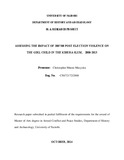| dc.description.abstract | Kenyan post-election violence and to ascertain how such impact did affect the girl child’s
positive beliefs and behaviour in actualizing her dreams in Kibera slum. Specifically, the study
seeks to examine the causes and impact of the post-election violence in Kibera slum, determine if
there was any gendered relationship in the impact of the violence on the girl child, discover if the
girl child used any strategies to cope with the violence and establish if the coping mechanisms led
to the girl child life’s success or failure after the violence.
The study was conducted in Nairobi’s Kibera slum. It adopted a survey design through interviews
and questionnaires. The subjects of the study comprised 75 questionnaire respondents and 16
interviewees from a representative population of the Kibera slum administrative units (villages).
Three sessions of different discussion groups were also held. Purposive, quota and snowballing
sampling procedures were used to sample the study respondents. The data collected was analyzed
using descriptive statistics.
The study utilized Anomie strain and feminist theory. The Anomie strain theory argues that
delinquency results from the blockage of goal-seeking behavior. Unable to achieve valued goals,
regardless of the causal factors thereto, individuals become frustrated and may turn to criminal
acts or other forms of anti-social behaviour as a result. This helps the study in investigating the
causes and gendered impact of the post-election violence on the Kibera girl child. The feminist
theory on the other hand analyzes the status of the girl child in the society as defined by male
dominant culture.
The study found out that the girl child in Kibera slum was largely impacted by the political
violence due to her vulnerability. Respondents across the age groups and gender reported diverse
impacts on the side of the girl child. Despite the optimism in their coping mechanisms, the
impacts of the political violence seemed to have had tow on the girl child’s otherwise bright
future.The study mentions adaptive coping approaches to adversity on the part of the girl child including
adaptation of new skills, counseling, and joining therapeutic groups. The regime and her partners
should guarantee respect of the rule of law and human rights discouraging harmful cultural
prejudices in support of the girl child. | en_US |

